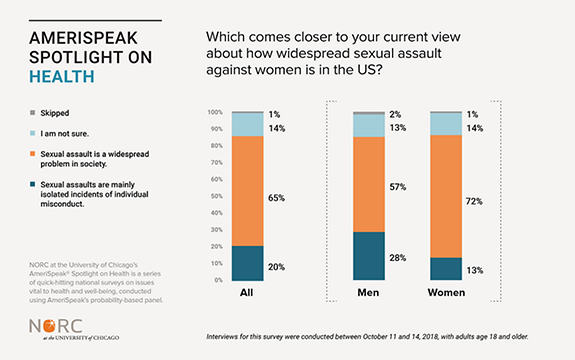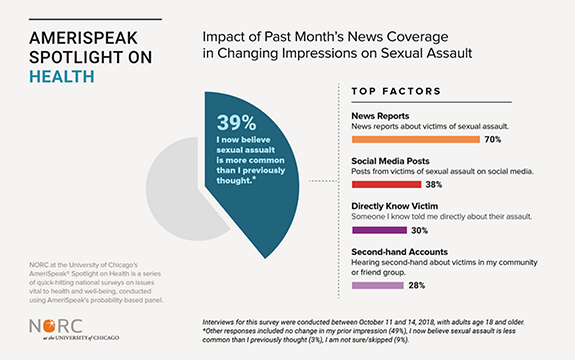Most Americans Believe Sexual Assault Is a Widespread Problem in Society
In the past month, 39 percent of people have changed their view and now say sexual assault is more common than they previously thought.
CHICAGO, Oct. 25, 2018 — Nearly two in three Americans (65 percent) now believe that sexual assault is a widespread problem in society, according to a new AmeriSpeak® Spotlight on Health survey from NORC at the University of Chicago. These views vary significantly by gender, with men being more than twice as likely as women to characterize sexual assaults as mainly isolated incidents of individual misconduct (28 percent vs. 13 percent).
The survey was conducted in mid-October, following coverage of Justice Brett Kavanaugh’s Supreme Court confirmation, which prompted many women to share their own stories of sexual assault.

“There are persistent gender gaps in how women and men view sexual assault, with men still much more likely than women to view sexual assault as isolated incidents of individual misconduct,” said Elizabeth Mumford, principal research scientist at NORC at the University of Chicago. “Differences in perspective about sexual assault are likely to inform how men and women think about ways to prevent these incidents.”
Recent events have influenced the public’s impression of how common sexual assault is; peoples’ views were often changed by stories from victims close to them.
Following the past month’s news coverage, 39 percent of people report that they now believe sexual assault is more common than they previously thought. Those individuals cited news reports about victims (70 percent) and social media posts from victims (38 percent) as the most frequent factors that impacted their thinking. Notably, 30 percent of people responded that their views were changed when someone they know told them directly about their assault, and 28 percent said they heard second-hand about victims in their community or friend group.
“Public allegations of sexual assault have empowered women to come forward and share their stories as well,” said Caroline Pearson, senior fellow at NORC at the University of Chicago. “When victims share their stories, it changes the thinking of people they know, those in their community, and the general public.”

Recent public discussions about sexual assault also influenced views on how many victims report their sexual assaults to police or friends and family—with 29 percent responding that fewer victims report their experience than they previously thought.
Young Adults’ Views Were Most Affected by Recent Coverage
Young adults (age 18-29) were most likely to report that their views on the frequency of sexual assault changed in the past month—nearly one in two young people (49 percent) said they now believe sexual assault is more common than they previously thought, compared to 39 percent overall. These young adults were more likely than other age groups to report a change in their views on how often victims report to police or friends and family. Overall, young adults were the most likely to report that sexual assault is a widespread problem in society, compared to the general adult population (73 percent vs. 65 percent).
More NORC Research on Sexual Assault
NORC researchers are studying sexual assault in a variety of populations, including police officers and among adolescents and young adults in dating/intimate relationships. Just within young adult intimate relationships surveyed through the Interpersonal Conflict and Resolution study, 8.6 percent of young adults report having been victims of sexual assault within the past year, and 4.3 percent admit perpetrating sexual assault against a partner. NORC researchers have developed evidence-based approaches to addressing sexual harassment and dating/intimate partner violence among youth that can be found here, here, and here.
Methodology
The poll included 1,098 interviews with a nationally representative sample of Americans using the AmeriSpeak® Panel. AmeriSpeak® is NORC’s probability-based panel designed to be representative of the U.S. household population. During the initial recruitment phase of the panel, randomly selected U.S. households were sampled with a known, non-zero probability of selection from the NORC National Sample Frame and then contacted by U.S. mail, email, telephone, and field interviewers (face-to-face). The panel provides sample coverage of approximately 97 percent of the U.S. household population. Those excluded from the sample include people with P.O. Box only addresses, some addresses not listed in the USPS Delivery Sequence File, and some newly constructed dwellings. Interviews for this survey were conducted between October 11 and 14, 2018, with adults age 18 and older representing the 50 states and the District of Columbia. A comprehensive listing of all study questions, complete with tabulations of top-level results for each question, is available on www.norc.org.
About the AmeriSpeak Spotlight on Health
NORC at the University of Chicago’s AmeriSpeak® Spotlight on Health is a series of quick-hitting national surveys on issues vital to health and well-being, conducted using AmeriSpeak’s probability-based panel.
About NORC at the University of Chicago
NORC at the University of Chicago conducts research and analysis that decision-makers trust. As a nonpartisan research organization and a pioneer in measuring and understanding the world, we have studied almost every aspect of the human experience and every major news event for more than eight decades. Today, we partner with government, corporate, and nonprofit clients around the world to provide the objectivity and expertise necessary to inform the critical decisions facing society.
Contact: For more information, please contact Eric Young at NORC at young-eric@norc.org or (703) 217-6814 (cell).





